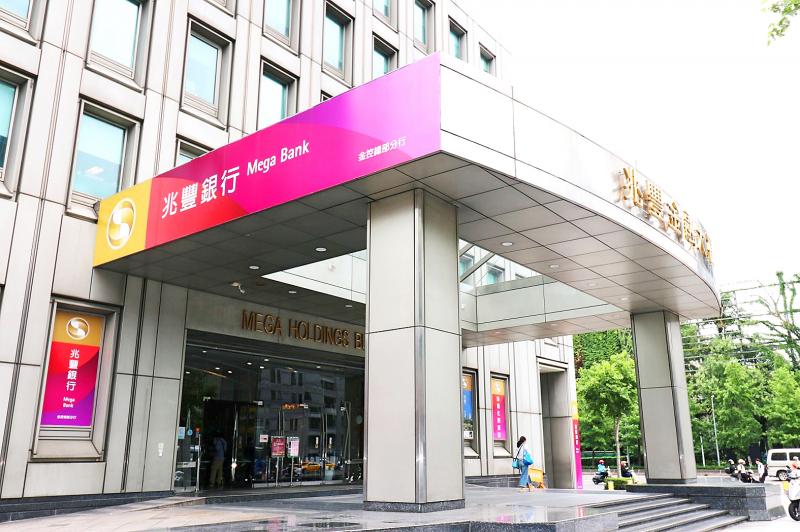State-run Mega International Commercial Bank (兆豐銀行) was yesterday fined NT$10 million (US$360,972) for its lax internal control over 28 mortgages totaling NT$350 million, whose applications were made by dummy accounts, the Financial Supervisory Commission said.
Mega Bank became the nation’s third bank to be punished for failing to detect mortgage applications made by dummy accounts. Hua Nan Commercial Bank (華南銀行) was fined NT$3 million in 2016 for offering mortgages to 34 figurehead accounts, some of whom belonged to vagrants, and Hwatai Bank (華泰銀行) was fined NT$3 million in 2018, commission data showed.
“It seems that this specific type of mortgage fraud has not been effectively curbed among local banks, ” Banking Bureau Deputy Director-General Huang Kuang-hsi (黃光熙) told a videoconference in New Taipei City.

Photo: Lee Chin-hui, Taipei Times
An employee surnamed Shih (石) working at Mega Bank’s Sindian branch (新店) in New Taipei City approved the mortgages from July in 2015 to the end of 2019.
However, the lender last year found in an internal audit that the mortgage applications were made by figureheads who used funds from a third party to repay the loans, Huang said.
Shih did not review the applicants’ profiles or conform to the bank’s loan approval criteria while approving the applications, and even helped transfer the third-party deposit money into the dummy accounts, he said.
Prosecutors have been working on the case since last year and have charged Shih, her ex-husband, surnamed Hsu (許), and a land administration agent surnamed Chou (周) with contraventions of the Banking Act (銀行法) and fraud, local media reported.
Shih reportedly worked with Hsu, who was a real-estate agent, and allegedly colluded with Chou to inflate the prices of the apartments she bought in Taipei and New Taipei City to obtain higher mortgages, and used the loan to buy other properties, local media reported.
Huang did not provide further details, but said that Mega Bank has made many mistakes in the mortgage operations, including incorrect collateral appraisal, and allowing the same employee to review loan applications and appraise collateral.
Mega Bank has estimated that it would likely incur a loss of NT$22 million due to the 28 problematic mortgages, Huang said.

POWERING UP: PSUs for AI servers made up about 50% of Delta’s total server PSU revenue during the first three quarters of last year, the company said Power supply and electronic components maker Delta Electronics Inc (台達電) reported record-high revenue of NT$161.61 billion (US$5.11 billion) for last quarter and said it remains positive about this quarter. Last quarter’s figure was up 7.6 percent from the previous quarter and 41.51 percent higher than a year earlier, and largely in line with Yuanta Securities Investment Consulting Co’s (元大投顧) forecast of NT$160 billion. Delta’s annual revenue last year rose 31.76 percent year-on-year to NT$554.89 billion, also a record high for the company. Its strong performance reflected continued demand for high-performance power solutions and advanced liquid-cooling products used in artificial intelligence (AI) data centers,

SIZE MATTERS: TSMC started phasing out 8-inch wafer production last year, while Samsung is more aggressively retiring 8-inch capacity, TrendForce said Chipmakers are expected to raise prices of 8-inch wafers by up to 20 percent this year on concern over supply constraints as major contract chipmakers Taiwan Semiconductor Manufacturing Co (TSMC, 台積電) and Samsung Electronics Co gradually retire less advanced wafer capacity, TrendForce Corp (集邦科技) said yesterday. It is the first significant across-the-board price hike since a global semiconductor correction in 2023, the Taipei-based market researcher said in a report. Global 8-inch wafer capacity slid 0.3 percent year-on-year last year, although 8-inch wafer prices still hovered at relatively stable levels throughout the year, TrendForce said. The downward trend is expected to continue this year,

A proposed billionaires’ tax in California has ignited a political uproar in Silicon Valley, with tech titans threatening to leave the state while California Governor Gavin Newsom of the Democratic Party maneuvers to defeat a levy that he fears would lead to an exodus of wealth. A technology mecca, California has more billionaires than any other US state — a few hundred, by some estimates. About half its personal income tax revenue, a financial backbone in the nearly US$350 billion budget, comes from the top 1 percent of earners. A large healthcare union is attempting to place a proposal before

Vincent Wei led fellow Singaporean farmers around an empty Malaysian plot, laying out plans for a greenhouse and rows of leafy vegetables. What he pitched was not just space for crops, but a lifeline for growers struggling to make ends meet in a city-state with high prices and little vacant land. The future agriculture hub is part of a joint special economic zone launched last year by the two neighbors, expected to cost US$123 million and produce 10,000 tonnes of fresh produce annually. It is attracting Singaporean farmers with promises of cheaper land, labor and energy just over the border.